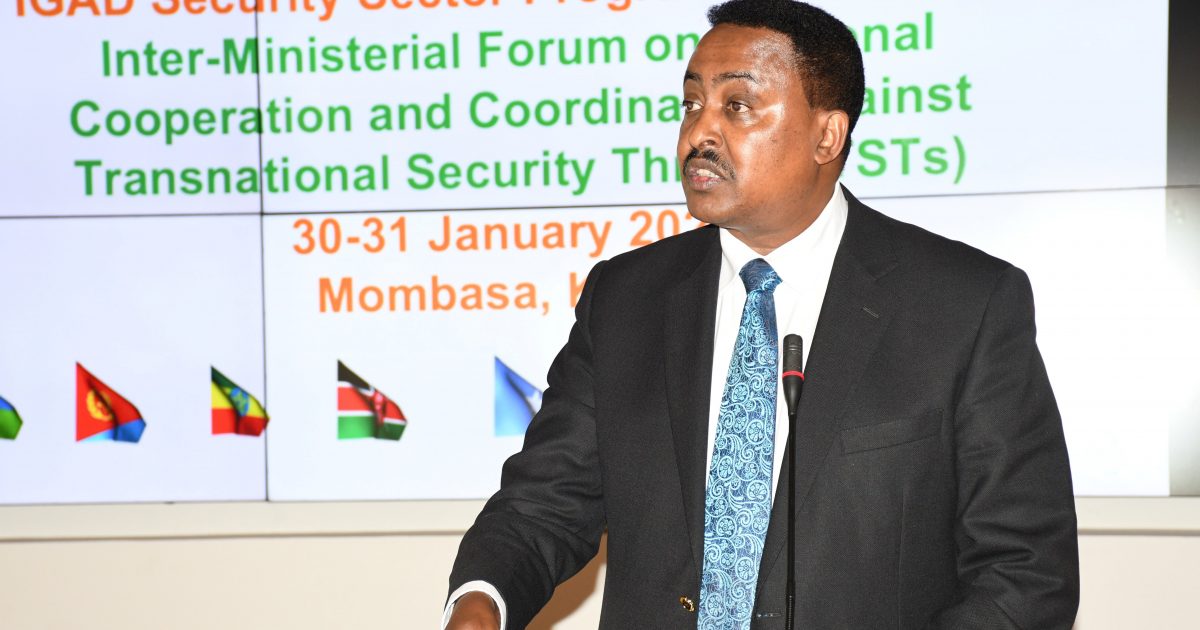The Intergovernmental Authority on Development Security Sector Programme (IGAD SSP), convened in Mombasa for an Inter-Ministerial Forum on Regional Cooperation and Coordination against Transnational Security Threats.
The objective of the two-day meeting, is to deliberate on how to address transnational security threats and engage law enforcement agencies and the criminal justice sector, against crimes and come up with joint responses and solutions.
The Forum will also provide member states with the opportunity to establish and strengthen personal and professional links between peer security sector institutions.
Addressing the media in Mombasa, IGAD Executive Secretary, Workneh Gebeyehu, said that the forum will also create a platform to share knowledge and experiences, from various sub-sectors in the criminal justice and law enforcement system and from respective jurisdiction on how to combat transnational security threats.
Some of the challenges that IGAD member states are facing include; infiltration of member states by terrorists, human and drug trafficking, cybercrimes, money laundering among others.
“By their very nature the impact of these crimes is not limited to one country. Instead, because of our increasing inter-connectedness and inter-dependence, we are experiencing the ripple effects on neighboring countries, thereby, making these hazards cross-border and transnational in nature,” said Gebeyehu.
He noted that as the region has made major strides in development in terms of information technology, criminals are also making progress in ensuring they win the technological race.
Gebeyehu, said by pushing forward the agenda for regional economic integration, IGAD and other multilateral bodies, are also unintentionally creating enabling conditions for transnational crimes.
He further noted that, felonious actors engaging in transnational crimes want to connect with each other. They are also not only expanding their networks through cooperation, but are diversifying their activities, including harnessing the global reach of the internet to open new criminal frontiers in cyber space.
The IGAD Executive Secretary said this avenue gives them the enhanced ability to converge a wider spectrum of actors, threats, cover a larger geographical area and increase the levels of violence that inevitably accompany any criminal enterprise.
“Transnational security hazards represent a significant and growing threat to regional security, with serious consequences for public health and safety, good governance, and economic stability. As a consequence, localized security challenges take on a regionalized dimension and at the same time regionalized security threats are making themselves felt in localized spaces,” he added.
He called upon for multilateral approaches which provides the most viable avenue for addressing shared security challenges, through enhancing a common appreciation of the problem, as well as cooperation and coordination on the most workable and effective solutions.
“We are working closely with member states through the various security, justice, law and order agencies and platforms to gain a better understanding of the transnational security threats prevalent in our region and we are now working to prescribe prevention and counter strategies that would be most effective for our region,” he said.
The Chairperson of the Kenya Law Reform Commission, Christine Agimba, said that there is need to adapt the law enforcement and criminal justice systems to make them effective and efficient as against the transnational security threats.
Agimba said that through technology, criminals have found new ways of masking and committing crime as electronic and internet based security threats have increased which make it possible for criminals to expand far and wide beyond national and regional borders.
“They have facilitated to the commission of secondary covering crimes such as money laundering, crypto currency platforms for instance have made it easier for criminals to send and receive money almost instantly and anonymously,” she said.
She said the crimes are no longer domestic concerns but international thus the need for concerted efforts to face the security challenges.
Agimba said a crucial way of staying ahead of the threats is to ensure that there are appropriate laws that define the crimes and jurisdiction of such crimes and also set appropriate framework for information and intelligence sharing across agencies and jurisdictions.
She added that in many jurisdictions, the challenge has been that law has not been developing quickly to deter some of the new crimes that have emerged to allowing criminals to exploit the gap.
By Chari Suche





